Student Thoughts
now browsing by category
Linguistic Articles
There are many linguistic websites/blogs out there. Seth and I have found a compilation of websites that we found interesting. We share below some fun and interesting linguistics sites.
1- http://linguistlessons.blogspot.com/
This is a classic linguistics blog. The author reviews and writes about miscellaneous things that relate to linguistics. He/she is most likely a linguistics professor.
2- http://www.ojohaven.com/fun/
This website has many links for articles and utilities that the author found useful. It is a great place to find linguistic inspiration.
3- http://www.reddit.com/r/linguisticshumor
If you don’t know what reddit is, it is a hub for miscellaneous blog type groups. There are many out there, but this one is for linguistics humor.
4- https://www.pinterest.com/ncihc/linguistic-humor/
Much like the reddit, there is a Pinterest for linguistic humor as well. This one has more photos and images that are quite funny.
5- https://instaedu.com/Linguistics-online-tutoring/
Do you need a linguistic tutor to help with homework and understanding? Here’s a website that hooks people up with tutoring for linguistic help.
6- http://linguistlist.org/ask-ling/
Don’t need a tutor, but have a problem/question that needs answering? Here’s a website where you can ask professional linguists anything!
7- http://www.linguisticsociety.org/content/why-major-linguistics
What is linguistics? This website shares general information to convince the lingu-idiots into being linguistics majors.
8- http://www.studyspanish.com/
a free online Spanish class with courses ranging from beginner to advanced.
9- http://www.spanishdict.com/
this website gives extensive word definitions in Spanish and also conjugates any verb that you can think of in the Spanish language.
10- http://8tracks.com/cherryamy/bonito
this website teaches the viewer the Spanish language through auditory segments and music.
a website used as an aid to teach a variety of different languages.
This website compares languages to one another.
Bonjour! Je m’appelle Jia
After taking a year of French in middle school, my love for this language has grown. I’ve always wanted to live in Paris and I would sometimes imagine myself strolling down the street just listening to everyone around me speak French. The language itself is fascinating and beautiful. Thankfully, I still remember the basics of French and can carry out a simple conversation. I think that French is a very commonly used language and is spoken in many countries around the world. Nonetheless, it is just a very fun language to learn and speak!

Many English words are of French origin in case you did not know that. Also, in English, the “p” and “k” sounds are often aspirated, while in French, the “p” and “k” sounds are generally unaspirated. To me, pronouncing the words in French is not as difficult as telling the time in French. When it comes to telling time, I definitely prefer the English method.
If you plan on travelling to any of these countries in the future, make sure to pick up some French before you go, or use an online translator. Also, learn the commonly used words and essentials of French and you will survive throughout your trip.
That’s it for now, Au revoir!

The Language within Us

Language Acquisition
A very helpful link that gives an overview of language acquisition. It describes all the stages of language acquisition. It is very detailed and gives specific examples. Since this a website mainly for teachers teaching students acquiring a second language, it focuses mainly on the stages of second language acquisition rather than first. It also provides recommendations and ways to help the development of second language acquisition.
http://www.colorincolorado.org/article/26751/
Here’s a set of video lectures on Youtube that discusses a sub branch of psycholinguistics, language acquisition to be more specific. The first video talks about the role of language acquisition within cognitive linguistics and the specific stages involved. The second video goes into more detail about the main developmental aspects during the acquisition process such as the babbling, one word or two word stage. The last and third video is about the main driving forces in the language acquisition process and delves into innateness of language and factors that influence a child’s language.
https://www.youtube.com/watch?v=prMGbLrbudA&list=UUaMpov1PPVXGcKYgwHjXB3g
https://www.youtube.com/watch?v=_12OZGNGlPU
https://www.youtube.com/watch?v=rWmjpAlEqN0
Language Processing & Framing
Here’s an interesting video on how Google uses natural language processing for spelling corrections. Natural language processing has allowed for interactions between humans and computers. This process enables computers to derive meanings from human language input.
https://www.youtube.com/watch?v=Sx3Fpw0XCXk
A very thorough article about cognitive framing. It describes what frames are and discusses the importance of frames. It also provides different forms of frames and a diagram to help us better understand it.
http://www.beyondintractability.org/essay/framing
The following two links are also about framing. The first one talks about the framing effects while the second one is about the frame theory.
http://www.adsavvy.org/the-power-of-framing-effects-and-other-cognitive-biases/
http://www.csun.edu/~rk33883/Framing%20Theory%20Lecture%20Ubertopic.htm
Language in the Brain
A very simple yet informative video on the language areas of the brain and the effects of damage to those parts of the brain. It also talks about aphasia and split brain patients.
https://www.youtube.com/watch?v=lBqShvm4QRA
A website that talk about the types and causes of speech and language disorders. It also shows the areas in the brain that ar e affected in each disorder.
http://emedia.leeward.hawaii.edu/hurley/Ling102web/mod5_Llearning/5mod5.2_disorders.htm
This website goes into very specific details about the Broca’s, Wernicke’s and other language processing areas in the brain. It also includes a model of spoken language functions in the brain, discusses how handedness affects brain lateralization and how the right hemisphere contributes to language.
http://thebrain.mcgill.ca/flash/d/d_10/d_10_cr/d_10_cr_lan/d_10_cr_lan.html
Talks about what happens to the brain when we listen and speak and how we process these words to form a response.
Secondary Languages
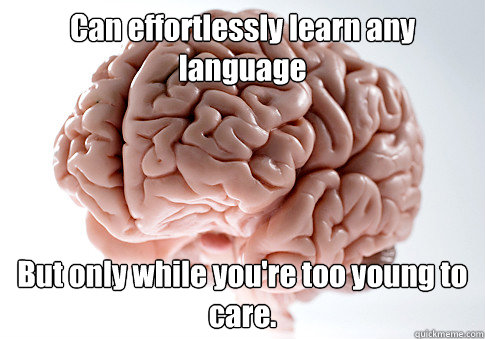
Have you ever had this feeling/thought?
It is one that comes almost exclusively when someone is trying to learn a new language.
Other than to get your high school diploma, why would you want to learn a second language anyway?
Well, for starters, how about some statistics about second languages. There are many places that use more than one language to communicate with each other. You, given that you may want to be more adventurous, you can help to preserve dying languages. If so, you can use some of these principles to learn the language.
Even here in America, and Puerto Rico, a second language is starting to become a necessity for communication:
http://io9.com/the-most-common-language-in-each-us-state-besides-engli-1575909143
http://www.topuertorico.org/culture/language.shtml
http://wfpl.org/post/what-jcps-doing-accommodate-explosive-growth-english-second-language-students
If you can learn that second language, it will be very beneficial. If you don’t think so, just ask them:


Linguistics Links
I am interested in linguistics because I would like to teach english as a second language. Most people who want to teach english, want to teach abroad. There are plenty of places all over the world to teach.
For someone to teach english, you’ll have to know at least one other language. There are lots of ways you can learn another language: online, in a classroom, and even by just going abroad! And there are plenty of people out there willing to give advice on how to learn a language. Here is a map of languages spoken throughout the world.
Also a very interesting thing to learn about is the different dialects spoken throughout the world. This website is a very detailed database of different dialects, where they are found, and the differences between similar dialects. In other classes I have more specifically learned about dialects of Spanish.
And to reward yourself for all your hard work and learning, here are some fun linguistics links:
Border Livin’
A big part of living a walking distance from the border to Mexico, means that two different cultures, customs, foods, people, and of course, languages collide and begin to merge into one.
SPANGLISH
Although i am not completely in favor of the use of spanglish, it is something that gradually happens as two different countries collide. It is a mix of english and spanish by speakers who have at least a basic understanding of both. I am sure this is also the case in border towns across the world. Many people agree that it is acceptable to use it and even defend it by explaining there is also a right way of speaking it with rules and syntax. Others simply simply classify it as jargon that “uneducated” people use. It cannot be classified, however, as a pidgin because its history can be traced (Spanish and English) and is not an entirely new language. Not surprising, even Hollywod has acknowledged the fact that Spanglish is big, bg enough to make a movie starring Adam Sandler.
http://en.wikipedia.org/wiki/Spanglish
https://www.youtube.com/watch?v=HXkSBXrdDxs
SAN DIEGO/TIJUANA
For many, home isnt one house, one city, or even one country. It includes the best of both worlds! (Yes thats a Hannah Montana song reference…) These border towns are the most visited in the world, bringing and taking different slang, and shared words. In a car ride home, we can hear the news regarding traffic from Mexico into the US as so many people cross every day. Even local newspapers have sections for it enabling easier access.
http://pehemedia.com/wp-content/uploads/2013/04/tij-sd.jpg
http://en.wikipedia.org/wiki/Mexico%E2%80%93United_States_border
http://www.utsandiego.com/news/local-topics/border-baja/
LINGUISTICALLY DELICIOUS FOODS
As many people that have moved to beautiful San Diego from across the country, they have tasted the many finger licking good foods Mexico has to offer right here in the United States. Although many are authentic (or at least claim to be) Mexican foods, there are numerous Mexican dishes with a touch of American familiarity. (No, Taco Bell is not real Mexican food, but it is an Americanized version of it.) We see a mixture of spanish and english in the very foods we all enjoy such as carne asada fries, jalapeno poppers, fish tacos, chicken quesadillas, etc. Dont get me started on the Tostilocos…
http://www.singlepage.com/on-the-border-79/menu?ref=yahoo
http://dontheapron.wordpress.com/2012/02/22/street-food-at-the-tijuanasan-diego-border/
http://www.sandiegomagazine.com/San-Diego-Magazine/August-2014/Best-of-Tijuana/
http://ryanandelizabethshideler.blogspot.com/2012/01/food-friday-tostilocos.html
MAS LINKS INTERESANTES Y DELICIOSOS (More interesting and delicious links)
https://sp.yimg.com/ib/th?id=HN.607993290176990331&pid=15.1&P=0
http://www.traditional-mexican-culture.com/traditions-of-mexican-american-culture.html
Blog 4: Link Blogging- Collier
For a long time, I have been interested in Korean culture and language. I wanted to learn Korean when I was in high school, but it was not offered at my school. I was planning to start learning Korean in college, but I became impatient, and I started self-teaching myself. I wanted not only to become fluent in the language, but to also learn about the culture of people in Korea.
Approximately, 50.2 people live in Korea. Worldwide, Korean is spoken by about 80 million people.
As I was starting to learn Korean, I needed to learn the Korean alphabet, because the characters used in the Korean language are very different than those used in English.
http://www.linguanaut.com/korean_alphabet.htm
There were many things that helped me learn grammar, expressions, and vocabulary, such as websites like these:
http://www.talktomeinkorean.com/
https://www.youtube.com/user/fluentkorean
https://www.youtube.com/user/sweetandtasty/videos
It also helped to watch Korean dramas and movies from websites such as these:
By watching famous Korean dramas, I was able to learn a bit about the Korean culture and pick up some words and phrases including slang while having fun. The same could be said for listening to Kpop, or Korean Pop. By listening to many common phrases in pop songs, I was able to pick up a few things. I also sang along while looking at the Korean lyrics to help me read Korean faster.
https://www.youtube.com/watch?v=6SwiSpudKWI
https://www.youtube.com/watch?v=pjnEeYAn4SQ
https://www.youtube.com/watch?v=prurE5jKrBg
In addition, I went to a convention last year called “Kcon” which included not only a Kpop concert, but a Korean culture festival as well.
http://kconusa.com/program#program-list
Many booths were set up that taught attendees about Korean food and culture.
Additionally, I am interested in learning how to make Korean food, and this youtube channel helped me out a lot:
https://www.youtube.com/user/aeriskitchen
I hope that someday, I will be able to be fully immersed in the Korean culture by studying abroad at Yonsei University in Seoul. After all, the best way to learn a language and learn about a different culture is to be surrounded by it.
Interesting Links
Here are just a few links I’d thought were relevant to language and linguistics.
Foreign Languages
-This are two that i used to help me study Japanese
http://www.easyjapanese.org/index.html
http://www.freejapaneselessons.com/
– I used this one to help myself learn a few words in Italian
http://www.oneworlditaliano.com/english/italian/italian-course-free-online.htm
Pidgins and Creole
-Because the topic of Pidgin and Creole languages where so interesting to me, here is a few links relating to it.
http://www.eyeofhawaii.com/Pidgin/pidgin.htm
http://aboutworldlanguages.com/creole-languages
Accents and Dialects
-Something i also found interesting about languages is how slowly over time, people start talking differently . even though it is the same accent, they develop differences. Accents and dialects show were you come from.
http://www.dialectsarchive.com/united-states-of-america
http://aschmann.net/AmEng/
Other Useful Links
-Here are just a few links that are related to linguistics that i found relevant.
http://en.wikipedia.org/wiki/Neurolinguistics
http://en.wikipedia.org/wiki/Origin_of_language
-This one covers just about everything i have learned in the class so far. its a good review for things forgotten about.
http://ielanguages.com/linguist.html
So, the new Pokémon game came out last week… (Link Blog)
…and, yes, Pokémon is still very much relevant today.

As with every release of each new Pokémon game, hundreds of these little critters are being introduced to the world. What began as a franchise consisting of 151 Pokémon species, is now home to a total of 719 different creatures (excluding 2 new Pokémon which has yet to be officially revealed)!
What fascinates me most about Pokémon, however, is how diverse and complex this fictional world has become, and a part of this is how Language (and basic concepts of Linguistics) are integrated in the franchise.
Believe it or not, the world of Pokémon, although largely fictional, is based on real places on earth. Furthermore, they are not limited to only specific places in Japan but extends to other regions. For example, the Kalos Region, one of 6 major regions in the Pokémon world, is based on France. Its capital, Lumiose City, is based on Paris, and the Prism Tower found in the city is, of course, inspired by the Eiffel Tower.
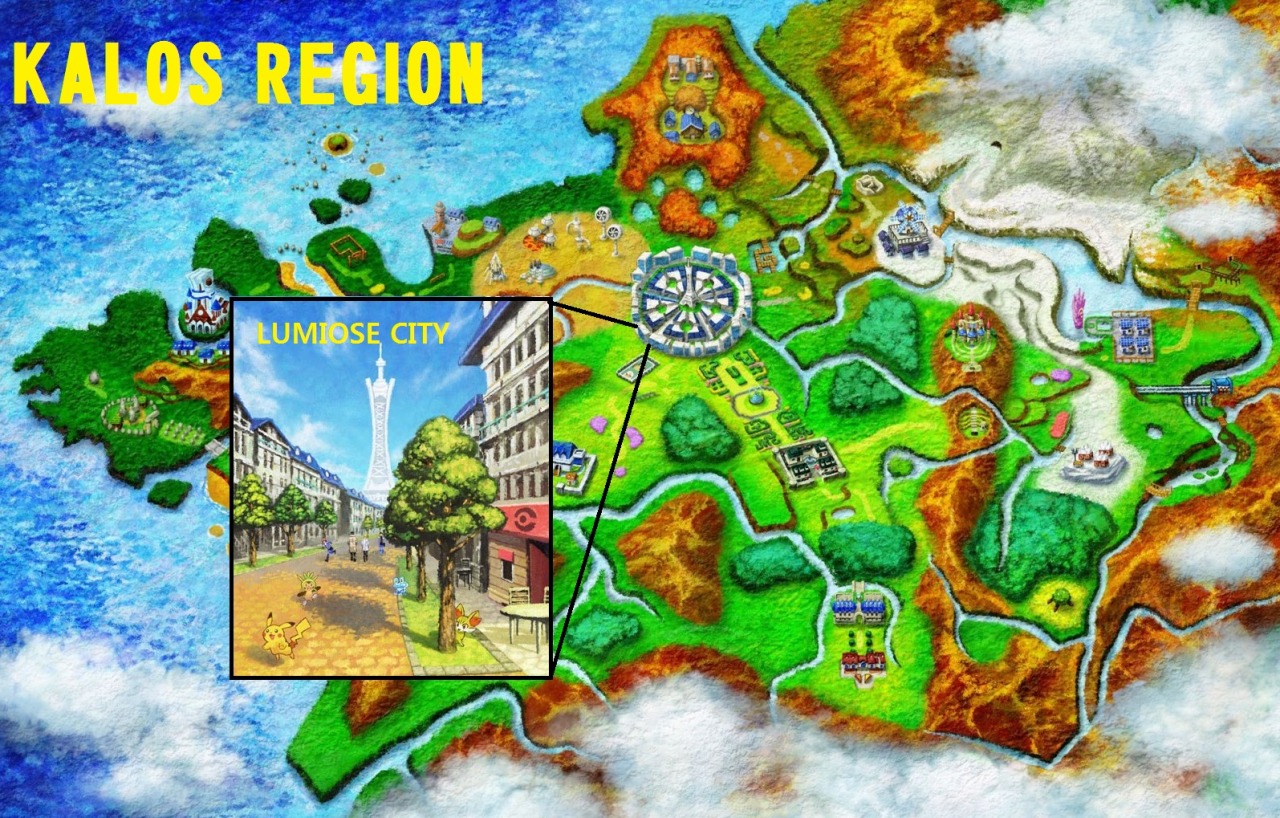
How does this relate to Linguistics in the Pokémon world? Well, it has to do with diversity. Because the Pokémon world consists of such diverse regions with its own unique inhabitants, Language Variation and Language Contact (Loanwords and Pidgin/Creole Languages) exist.
While it does sound childish, the names of each Pokémon are quite interesting. Looking at the etymology of each name often show a mix between different languages (A list of Pokemon name origins).
A more complex name can be seen in the newest Pokémon, Diancie (Pokémon #719), which includes the use of loanwords.
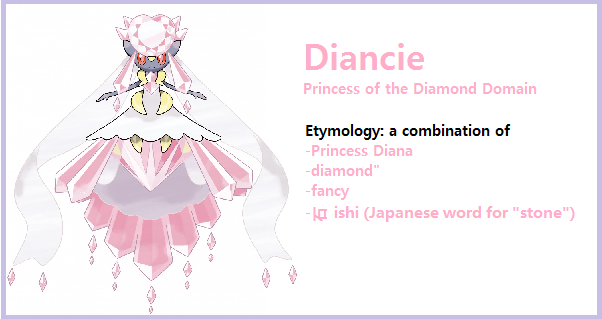
As mentioned before, “Pidgin” Languages also exist in the Pokémon world. Although not as extensive as real Pidgin Languages, the Orange Islands is a region that has its own unique versions of the language, varying with each different island.
Finally, there is an entirely separate language spoken by the Pokémon themselves. Interestingly enough, there are quite a lot of similarities between Pokemon Language and Animal Communication in Linguistics. Morever, the humans in the Pokémon world are unable to learn and understand Pokémon language just as humans in the real world can not learn animal language.
In fact, there are many cases in the Pokémon world where children are raised by Pokémon (ex. Kangaskhan Kid). They are pretty much similar to feral children (ex. Genie) in that it is extremely difficult for them to acquire human language. Chomsky’s critical period hypothesis? Perhaps. Perhaps not.
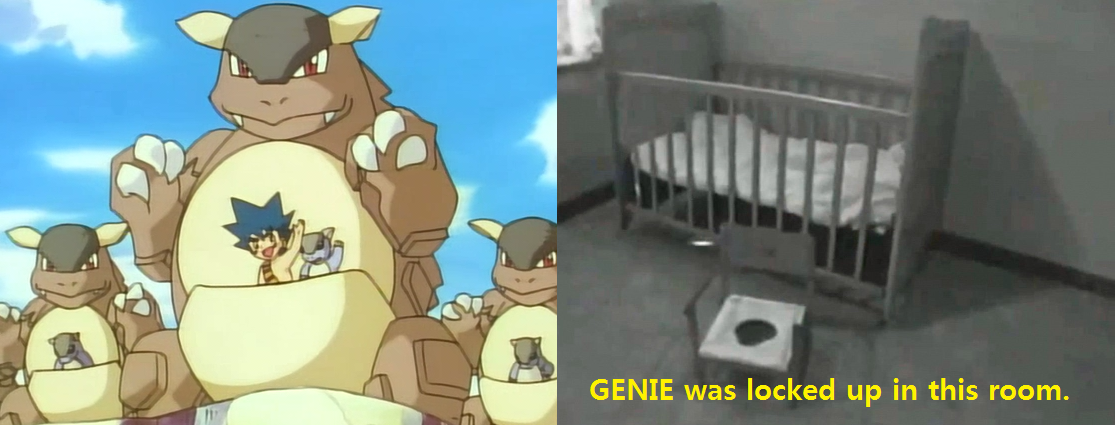
There is, however, a very odd Pokémon named Meowth that can speak and understand both Pokémon and human language. The way this creature acquired human language is very similar to how babies acquire language (Child Language Acquisition) and the stages involved in first language acquisition (Babbling Stage -> One Word Stage -> Multi-Words).


Well, that’s it for my geeky take on Pokémon and Linguistics.
Blog 4-Link Blogging
Linkguistics!
Accents and Dialects:
Is there such a thing as a “gay accent?” I wouldn’t even touch this question were there not a decent amount of scholarly research about it. The notion of “talking gay,” after all, is a staple of homophobic parody. So before going further, let me state that I believe gay men speak with as wide an array of voices as heterosexual men. I don’t give credence to the idea of a universal “gay voice.” Read more
Here’s another interesting perspective on GayDialect:
http://www.macleans.ca/society/of-lisps-and-linguistics-the-power-of-the-gay-voice/
More on accents and dialects:
http://media.her.ie/wp-content/uploads/2014/04/tumblr_m9ujoh5EF11qcazydo3_500.gif
http://media.tumblr.com/tumblr_mf6s5s8Xbw1rol1w1.gif
Abbrevs and Misplelings:
When two friends created the site I Can Has Cheezburger?, in 2007, to share cat photos with funny, misspelled captions, it was a way of cheering themselves up. They probably weren’t thinking about long-term sociolinguistic implications. But seven years later, the “cheezpeep” community is still active online, chattering away in lolspeak, its own distinctive variety of English. Read more
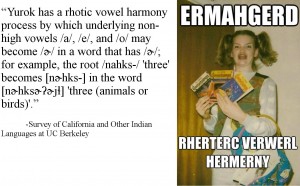
Imitation Theory:
Check out this article on children recognizing the language of the country they were born (but not raised) in:
http://www.columbiachronicle.com/health_and_tech/article_1765d862-797f-11e4-968f-27ec0ff6f1cd.html
Creoles:
From our very own Professor Bigham on universal linguistics:
The Fulani have not only lost many herds to rustlers, they may be losing their language as well. But the language is rising in Europe and the USA, where it is studied in a total of 14 universities. Read more
Animals and Language:
Animals communicate with each other, and sometimes with us. But that’s where the similarity between animals and us ends, as Jason Goldman explains: http://www.bbc.com/future/story/20121016-is-language-unique-to-humans
Con Slobodchikoff at Northern Arizona University has done some of the most amazing studies in animal communication and cognition. Using sonograms to analyze the distress calls of Gunnison’s prairie dog, one of five species of prairie dogs found in the U.S. and Mexico, he has found that prairie dog colonies have a communication system that includes nouns, verbs, and adjectives. They can tell one another what kind of predator is approaching — man, hawk, coyote, dog (noun) — and they can tell each other how fast it’s moving (verb). They can say whether a human is carrying a gun or not. Read more


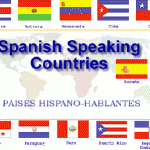
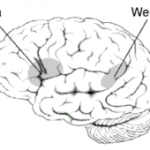

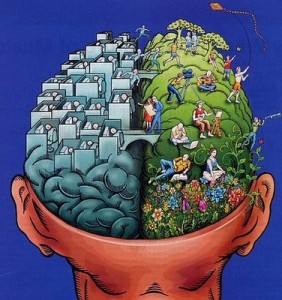
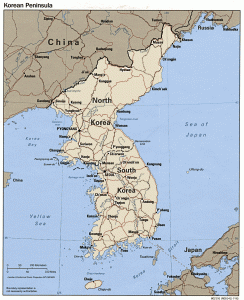



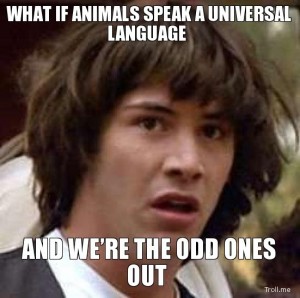
 D5 Creation
D5 Creation